Some books are simply classics and will remain evergreen. While it is impossible to list all the amazing indigenous books that have shaped Nigerian children’s literature over the past few decades, we can discuss our top five books and their authors.
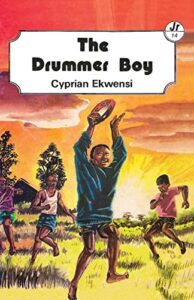
First published in 1960, “The Drummer Boy” tells the story of a talented but blind drummer boy and singer, Akin, who is moved around from place to place to entertain people with his talent and his precious tambourine. However, deep down, things are not as peaceful as they appear. Akin is unhappy and in search of true happiness. Unfortunately, he doesn’t know who among his “friends” was trustworth.
Written by Cyprian Ekwensi, “The Drummer Boy” was so popular it was read in schools across the nation for years. A fellow of the Nigerian Academy of Letters and one of Nigeria’s most popular writers, Cyprian Ekwensi also wrote hundreds of short stories, radio scripts, television scripts, novels, as well as children’s books.
We love this book because Ekwensi expertly explores the topics of colonialism, disability, music as entertainment, sense of community, man’s good and evil natures, self-awareness, self-sufficiency, innocence, kindness, criminal activities and much more in a way that is not overwhelming for young readers.
Chike and the River by Chinua Achebe
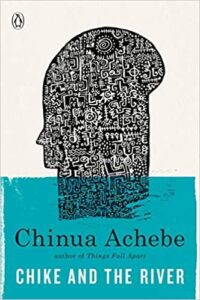
Published in 1966, “Chike and the River” is a children’s book written by Chinua Achebe. In the story, Chike, an 11-year-old boy with a mother and two sisters, leaves his village, Umoufia to live with his uncle in a big city. Chike is restless and seeks adventure and so embarks on a mission to cross the River Niger before a bridge was built across the river. He does not have the funds needed for the ferry, but he is determined to make it over to the other side, one way or another.
Achebe, one of the world’s most loved writers and the father of modern African literature, crafts the beloved story of “Chike and the River” which when explored in depth, is a magical story about loneliness, curiosity, survival, bravery, growth, and redemption.
We love the book because Achebe, through his expert storytelling, takes young readers for a ride along the River Niger, invariably teaching them about River Niger through Chike’s experiences. This was the very first of many children’s stories that Achebe would eventually write.
The Bina Series by Adaeze Atuegwu
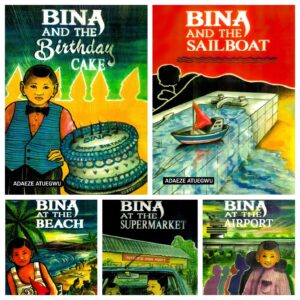
Almost every Nigerian child who grew up in the late nineties and early 2000s read Adaeze Atuegwu’s Bina Series – “Bina and the Birthday Cake”, “Bina and the Sailboat”, “Bina at the Beach”, “Bina at the Supermarket” and “Bina at the Airport”. Bina is a 6-year-old boy whose mission in life is to be as mischievous as can be.
Atuegwu, known as Nigeria’s youngest most prolific author after publishing seventeen books at 17 years old, starts the Bina series with the main character, Bina in primary one, and follows him through a series of five books as he gets older and more mischievous. The Bina series was so popular it inspired a trend of haircut like Bina’s hairstyle and aptly named after him.
We love these series because young Atuegwu, expertly connects each book so you are left wanting for more. Each new story starts with a flashback of the prior story and ends with a snippet of what is to come. It is easy to get hooked to this engaging series as well as Atuegwu’s “Lizzy” books, a series of stories about a naughty girl.
Without a Silver Spoon by Eddie Iroh
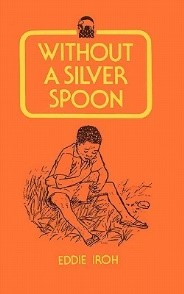
This is a heart-warming story about Ure, a poor but honest boy who works as a houseboy to afford school fees. This book teaches that honesty is the best policy as experienced by Ure when he is accused of being a thief. First published in 1991, “Without a Silver Spoon” was a household name and widely read across the nation.
Eddie Iroh is the author of other popular books including “The Siren in the Night,” and “Toads of War.” “Without a Silver Spoon” is no doubt sad in some areas due to the subject matter it deals with, but at the end, it upholds the importance of integrity and self-resilience in the face of all adversity.
We love this book which was the winner of the International Board on Books for Young People, Certificate of Honour, because it builds character and inspires hope for everyone regardless of their situation. Edie Iroh does a superb job of expertly managing a delicate subject matter and executing it flawlessly in a way that is engaging and believable.
My Father’s Daughter by Mabel Segun
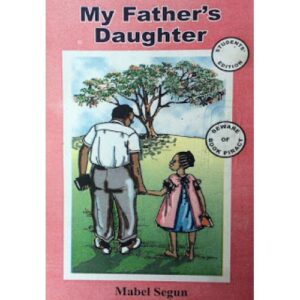
First published in 1965, “My Father’s Daughter” is an inspirational and extraordinary story of the memories of a little girl growing up in a Nigerian village where her father was the clergyman, banker, and doctor. “My Father’s Daughter” tells the girl’s story through the age of eight when her father dies and then continues the story in “My Mother’s Daughter” until the narrator leaves for secondary school.
We love this book because it is a rare instance for young (and older) readers to take a deeper look at the life of a celebrated figure. Both books are published in the African Reader’s Library Series and emphasize the importance of education in Segun’s as well as in most Nigerian families.

